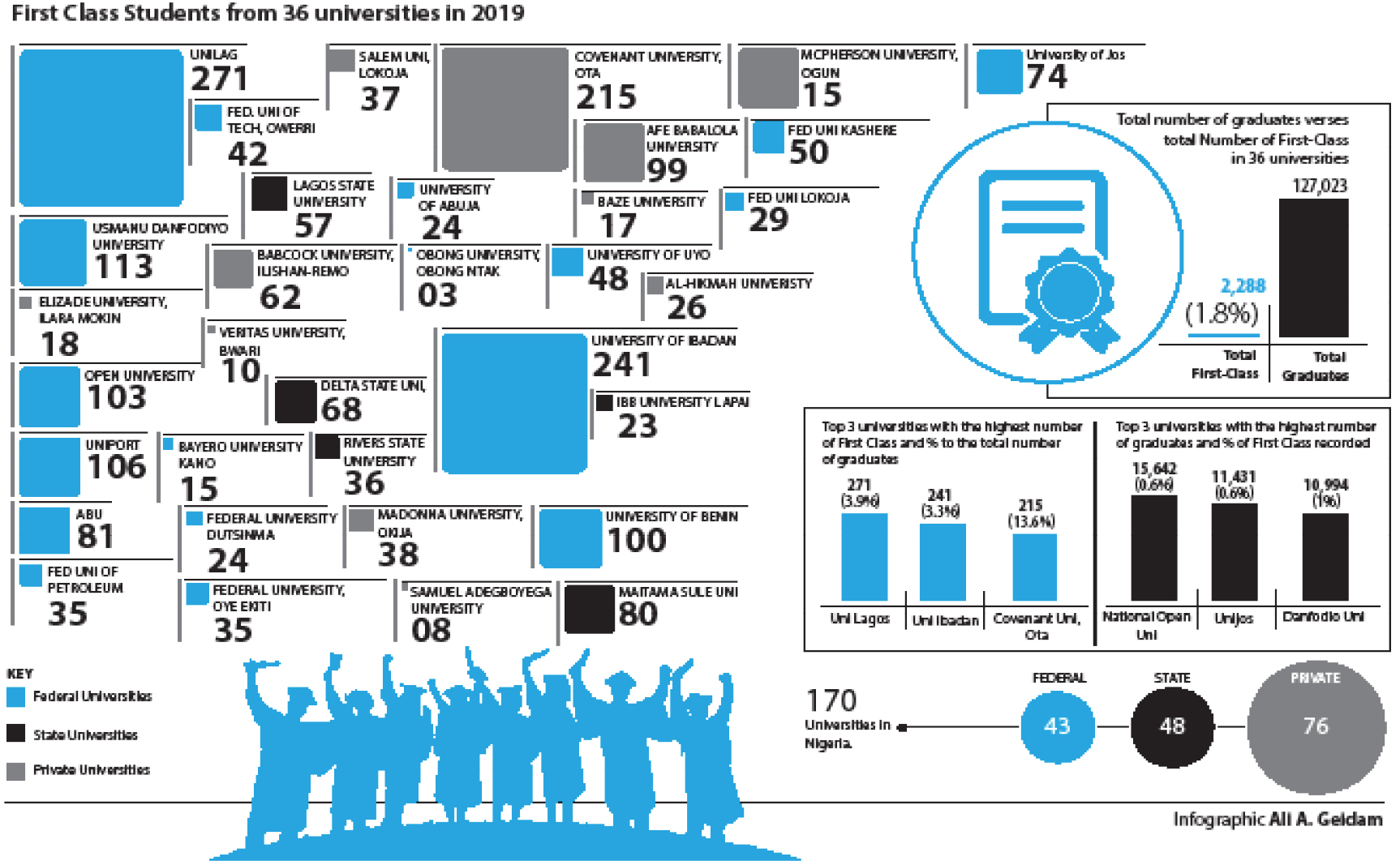- As employers look beyond grades
Thirty-six Nigerian universities produced 2,288 graduates with first class honours degrees in 2019, Daily Trust reports.
First class is the highest honours degree one can achieve on completion of studies in a university or a specialised institution like the law school.
A tally put together by our reporters showed that the first class graduates were selected from a total of 127,023 students that completed their studies in the select schools within the time under review.
Private universities were far ahead in this relatively new-found penchant for granting first class degrees to graduating students that read different courses, Daily Trust reports.
For instance, during the 2018/2019 convocation of Covenant University, Ota, Ogun State, 215 out of its 1,580 graduands were graded first class, representing 13 per cent.
Afe Babalola University produced 99 first class out of the 979 students that graduated, and Babcock University had 62 first class graduands out of the 1,926 students that bagged various degrees from the institution.
The publicly funded universities have also escalated the number of students getting the highest degree award.
The University of Lagos, for instance, recorded 271 first class during its 2018/2019 session out of 6,992 students; while the University of Ibadan had 241 first class candidates out of 7,330. Usmanu Danfodiyo University Sokoto had 113 first class out of 10,994 students, while University of Port Harcourt recorded 106 first class degrees from 4,771 students it graduated this year.
In November, the Council of Legal Education (CLE) called a total of 4,456 law graduates to the Nigerian Bar, out of which 147 candidates came out with first class honours.
“I have a first class degree in economics but could not get any job befitting my status,” said Mohammed Salihu, a teacher in a private school in Abuja.
Another first class student had in March, this year, called the anchor and self-styled Ordinary President Ahmed Issa that he had given up hope of finding a decent job after graduating from the University of Calabar with a first class.
Dr Ben Ugwoke of the Department of Chemistry, University of Abuja, blamed the new trend of awarding many first class status to graduating students on the desire of universities to make their products “competitive”.
He said: “I suspect that various universities are now in the habit of giving first class to many graduates just to increase their employability. I am not too sure it reflects their academic abilities.”
Speaking on the implication, Dr Ugwoke said, “If you want to destroy a country, all you need to do is to lower the standard of education and that is what we are seeing now. If you give a first class to someone not deserving it, the public, the employer will view them as first class material.”
He explained that because to whom much is given much is also expected, such students “will be placed in some serious positions to make decisions on behalf of the system and if truly they are not first class graduates, their decisions can never be first class; their decisions will be faulty and that will be calamitous for the entire country.”
Prof. Umaru Pate, Dean of Post Graduate Studies, Bayero University, Kano, said, “The trend is worrisome because there are allegations that some of the universities do so to attract candidates as they will be seen as serious institutions where people will come in and graduate with very good grades.
“This is particularly so in a situation where the job market is very stiff and highly competitive. So they (universities) could do that to encourage entries as well as promote the job marketability of their candidates.”
He noted also that the pressure of wanting to meet up with conditions stipulated by the PTDF to access their scholarship grants could be partly responsible for the desire for students and school managements to award first class degrees.
Prof Pate, however, explained that the increase in the number of first class could also be attributed to the higher number of universities in the country.
“With 171 universities as against what obtained four decades ago, there is strong justification for the number of first class to spike,” he said.
“Yes, we have agreed that the universities have increased, the population has also increased and courses have increased and the level of intelligence among our students, perhaps has also increased, maybe higher than what we used to see,” he noted.
However, he queried the figures being churned out thus: “It is worrisome when you see one university whose capacity sometimes leaves room for doubt come out with a number that appears to be incomprehensible. There are numbers that if they come up with, one can understand,” Prof. Pate said.
“If you have 10,000 students graduating and you have 100 of them coming out with first class, that could make sense but when you have less than 2,000 graduating students and you have a number of first class that exceeds a certain figure… Some of the universities produce numbers that do not make sensible comprehension by any individual or for some of us who are in the system,” he said.
Another professor who didn’t want his name mentioned, said, “the trend of universities graduating high number of first class students is a criminal activity.”
On how to reverse the trend, he said, “as far as education budget remains lower than what is required by UNESCO, criminal activities in the university system will continue.”
Spokesman of the National Universities Commission (NUC) Ibrahim Yakasai told Daily Trust in an interview that, “we have noticed the steady rise of people getting first class especially in private universities.”
According to him, “We are not unaware of what the situation is, but we are also not going to conclude that universities are just dashing out first class.
“The commission is conducting some surveys. Once the survey is over, the universities’ vice-chancellors will be engaged to work out a lasting solution,” Yakasai said.
The NUC spokesman further noted that “the reality of the situation is that only a few people who are exceptionally brilliant should get first class and they are in the minority anywhere in any school.
“So, when we see a trend where a lot of people are becoming exceptionally brilliant, then you need to question the system and that is what we are doing,” he said.
Daily Trust reports that during a retreat hosted by the NUC recently, one of the items on the agenda was the rising number of first class graduates.
Why the increase
The Deputy Registrar and Academic Secretary of ABU, Malam Bashir Abubakar, said the number of graduands with first class degrees has been increasing since the introduction of the semester system.
He said the system presents little or no difficulty to students because examination is done at the end of each semester unlike the previous system in which assessment was conducted at the end of the year.
He said before the start of every academic year, ABU carries out orientation exercise for new students during which they are told to improve their academic performance in the early semesters, mostly during the first year which normally determines the final grade of any undergraduate course.
He said students who start with a 4.0 GPA scale which represents an A, normally obtain first class degrees in their final results.
He said the number of graduands with 4.0 scale and above also increased because students put remarkable effort to win various prizes set aside by the university, individuals and corporate organizations for best graduating students.
Employers’ nightmare
“Many years ago, first class degree holders were sought after by the university system, multinational corporations and banks because of their exceptional educational performance,” says Eshiotsekhai Suleiman, a public affairs analyst.
“Not anymore. The rise in the number of first class awards to students both in private and public funded universities has made a mess and cheapened the once revered and appreciated class of distinction,” he said.
The Managing Director of FAB Consulting Nigeria Ltd, Felix Adedayo, said, “these days, you will be invited by multinationals for interview because you have first class but getting the job will be based on your performance.
“It is during interview that you get to realize that most people do not merit the certificates they are carrying, and this is because most of the private schools are more of a business centre,” he said.
“I did an interview for 56 candidates and it was a boy who got upper credit during his diploma programme that emerged the best. He triumphed over degree holders with some of them having first class honours,” he said.




